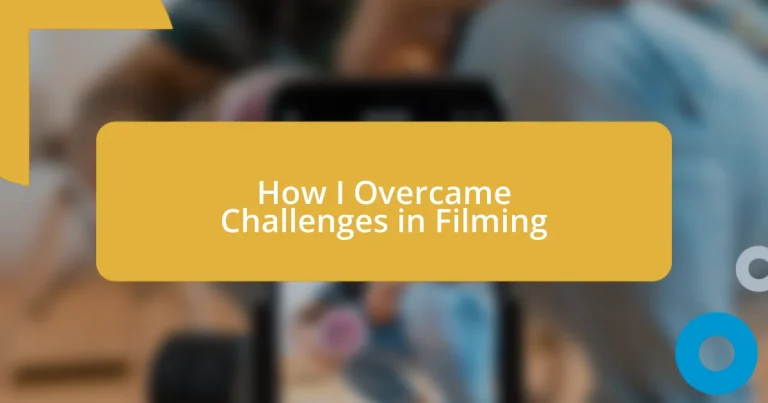Key takeaways:
- Filming challenges, such as unexpected weather and tight budgets, can lead to innovative solutions and emphasize the importance of flexibility and preparation.
- Personal obstacles like self-doubt and time management highlight the need for open communication and teamwork to foster a supportive creative environment.
- Learning from setbacks, such as technical malfunctions and casting changes, can transform challenges into opportunities for growth and improvement in future projects.
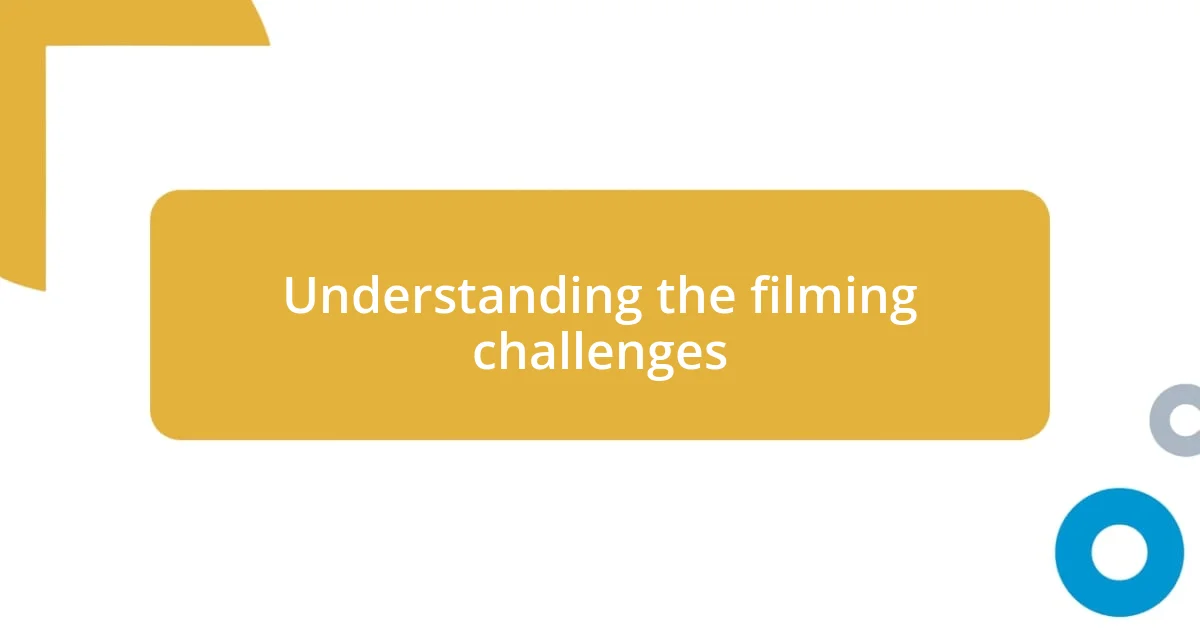
Understanding the filming challenges
Filming challenges can arise from a myriad of sources. I remember one particular shoot where unexpected weather changes completely altered our schedule. We had painstakingly planned every detail, only to be met with a sudden downpour. It made me wonder: how often do we assume we’re prepared for everything, only to be blindsided by nature?
Another challenge I’ve encountered is working with tight budgets. There was a time I had to creatively problem-solve on a low-budget project. The limited resources forced our team to think outside the box, and I found that this restriction often sparked some of our most innovative ideas. Have you ever realized that sometimes, constraints can lead to the most creative solutions?
Lastly, working with a diverse crew brings its own set of challenges, especially when it comes to communication. I once worked with individuals from various backgrounds, and it was enlightening but also brought to light many misunderstandings along the way. I truly believe these moments taught me patience and empathy, which are just as crucial to filmmaking as technical skills. Isn’t it fascinating how teamwork can sometimes be the greatest test of all?
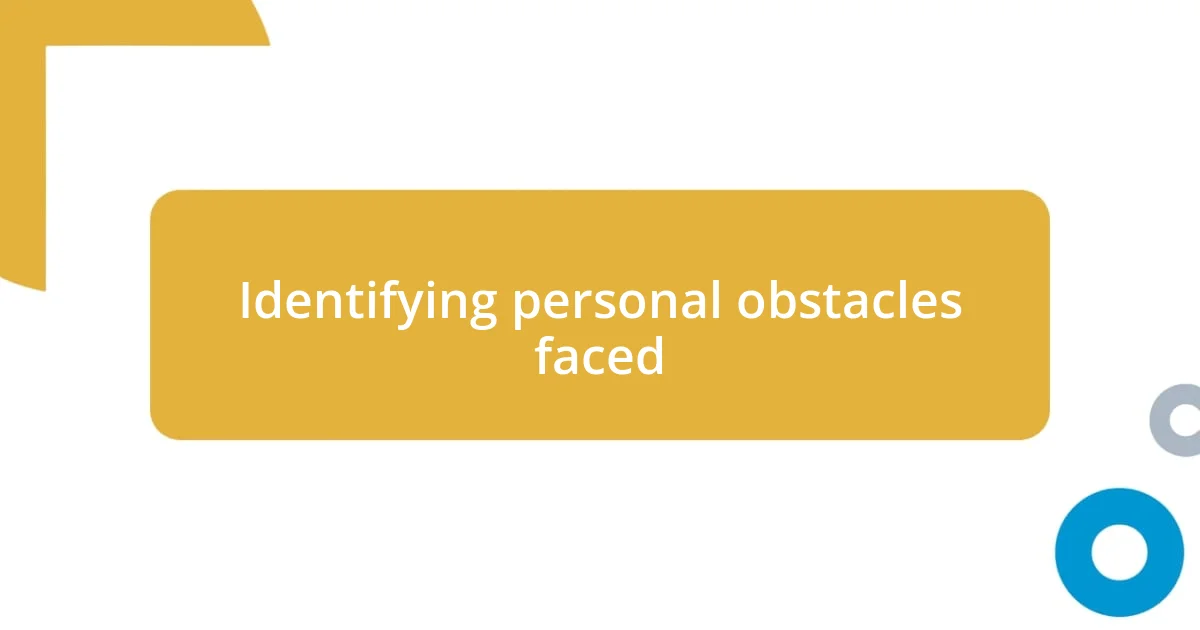
Identifying personal obstacles faced
Identifying personal obstacles faced has often been an eye-opening journey for me. For instance, during a shoot for a documentary, my confidence wavered in front of the camera. I’d always been behind the lens, and suddenly being the focal point made me question my abilities. It felt like standing on a tightrope, balancing between wanting to express myself and fearing judgment. Has anyone else felt the weight of their own insecurities in a creative space?
Moreover, time management has been a persistent challenge. On one occasion, I underestimated the time needed for pre-production tasks and found myself racing against the clock just days before our shoot. I learned the hard way that prioritizing tasks is essential—not just for workflow, but for my peace of mind. How can we better organize our schedules to avoid similar pitfalls? I often revisit this lesson and find that planning realistically can ease much of the stress.
Lastly, dealing with self-doubt continues to be a personal hurdle. There was a period when I questioned whether my vision was worth pursuing—wondering if I was good enough to create meaningful work. I realized this feeling is common among filmmakers, and voicing these doubts to peers can be therapeutic. Have you ever shared your fears with someone, only to discover you’re not alone in them? Talking things out can transform that heavy burden into a collective experience of growth.
| Obstacle | Personal Insight |
|---|---|
| Lack of confidence | Feeling vulnerable when in front of the camera for the first time was a humbling experience. |
| Poor time management | Underestimating pre-production tasks taught me the importance of realistic planning. |
| Self-doubt | Sharing my fears with peers highlighted that many experience similar feelings. |
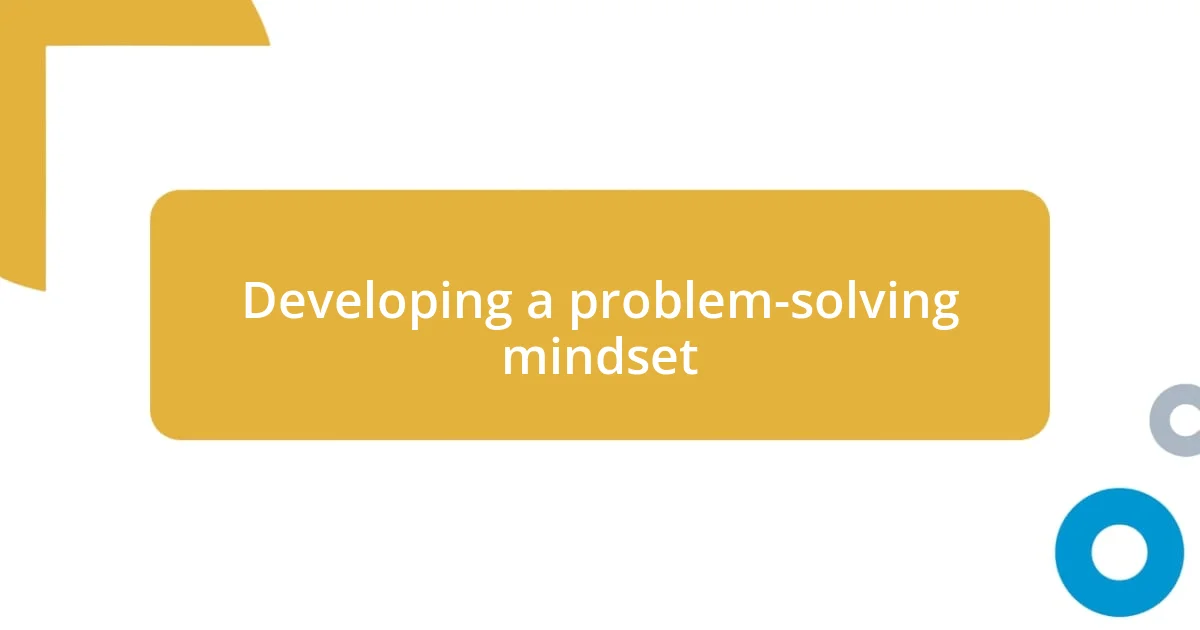
Developing a problem-solving mindset
Developing a problem-solving mindset has been crucial in my filmmaking journey. I recall an instance during a project when our primary location suddenly fell through just days before filming. It felt like the ground had shifted beneath my feet, but instead of succumbing to panic, I gathered my team and brainstormed alternative locations. That moment underscored for me how flexibility can transform challenges into opportunities; it pushed us to explore new ideas and think creatively about our environment. Have you ever had to pivot dramatically and found unexpected treasure in the chaos?
- Stay calm under pressure—taking a breath can open your mind to new solutions.
- Embrace creativity; sometimes, the best ideas stem from constraints.
- Involve your team in the problem-solving process; collaboration can lead to breakthroughs.
On another occasion, during a shoot for a short film, we faced an unexpected technical malfunction with our primary camera. It was a moment of sheer frustration, but rather than dwell on what was going wrong, I chose to focus on what we could do. My team quickly organized a backup and adapted the script to accommodate the new filming style. This experience taught me that when faced with setbacks, viewing them as opportunities to innovate can spark thrilling changes, leading to outcomes we hadn’t anticipated. Can you recall a time when a setback became a stepping stone instead?
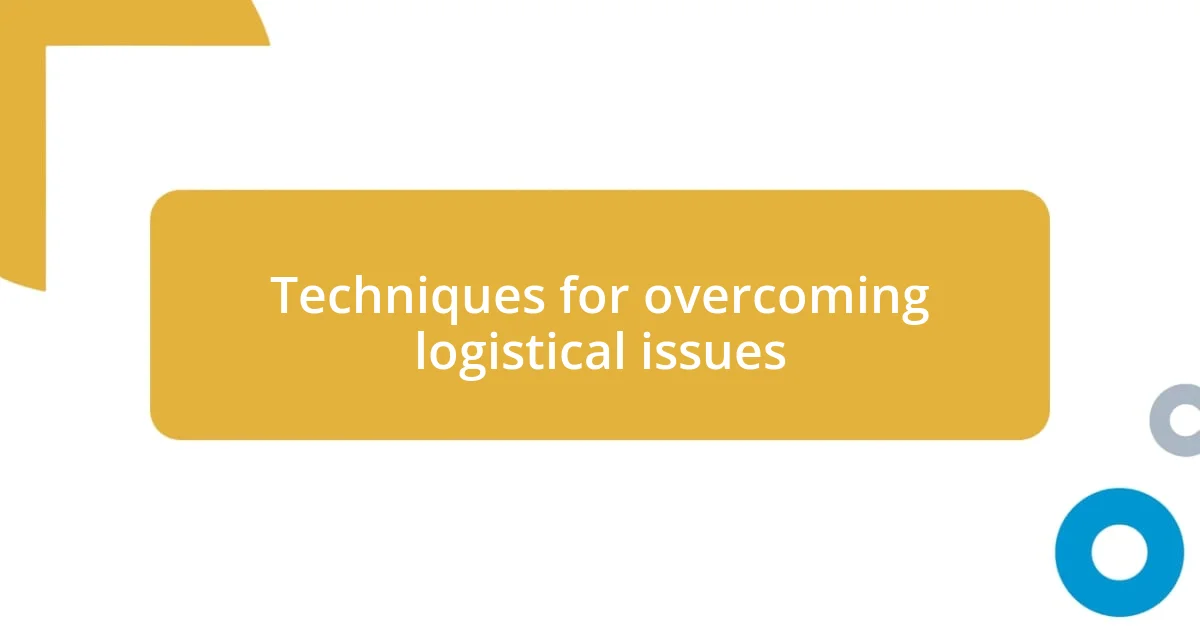
Techniques for overcoming logistical issues
Logistical challenges can arise unexpectedly, and I’ve found that the best way to tackle them is through careful preparation. For instance, on a recent project, we faced an unexpected issue with permits for a location. Rather than leaving things to the last minute, I had previously created a backup list of alternative sites that were not only accessible but also visually striking. Honestly, knowing I had options gave me a sense of control and relief. How often do we take the time to prepare for the worst-case scenario?
When we were dealing with tight schedules and unpredictable weather, my team adopted a fluid approach to our filming timeline. One day, rain threatened our outdoor shoot, and instead of panicking, we utilized that time to focus on indoor interviews. This adaptability allowed us to keep our momentum going, and I realized that flexibility in logistics can turn potential disasters into unexpected productivity. Have you ever found that a shift in plans can open up new opportunities?
Communication is another essential technique for overcoming logistical issues. During a particularly involved shoot, I made it a point to hold daily huddles with my team to ensure everyone was on the same page. This quick check-in helped us address any emerging issues proactively, leading to smoother operations overall. I discovered that fostering an environment where team members feel comfortable sharing concerns can significantly enhance efficiency. How often do we emphasize the importance of communication in our projects?
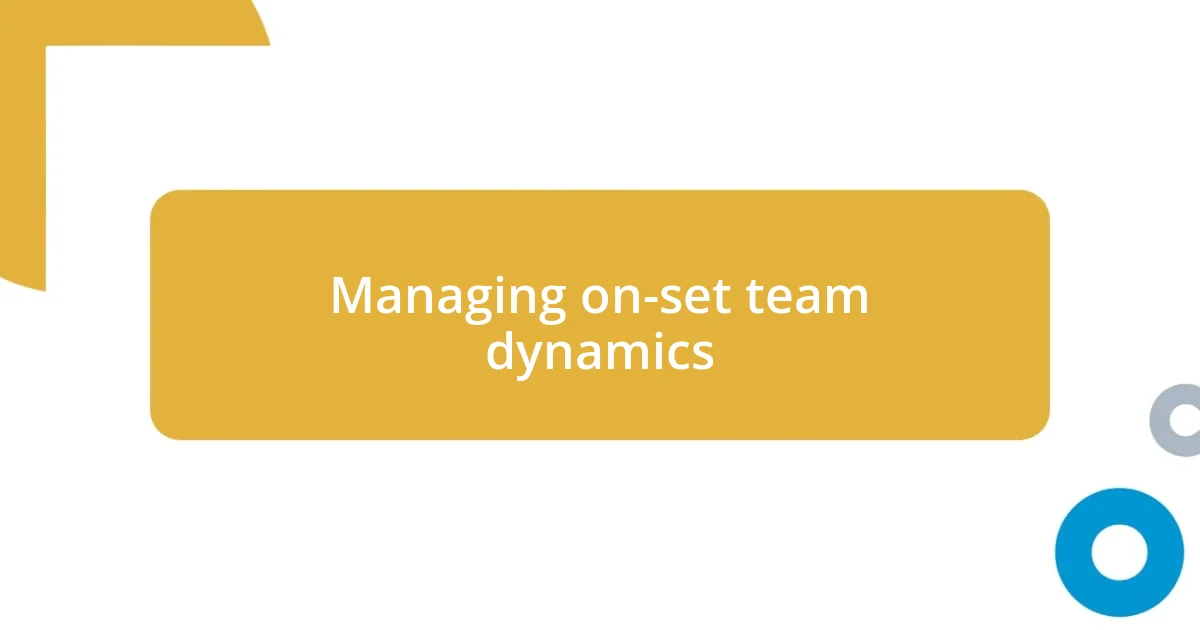
Managing on-set team dynamics
Managing on-set team dynamics is inherently complex, as each individual brings unique personalities and perspectives to the table. I remember a day on set when tensions flared between the cinematographer and the director over creative decisions. Instead of letting the atmosphere become charged with frustration, I facilitated a quick dialogue between them. It was a simple move, but it reinforced the value of open communication and ensured we maintained a collaborative spirit. Have you ever witnessed a conflict escalate, only to find that a thoughtful nudge toward dialogue could resolve it?
In another instance, we were deep into filming, and a few crew members were feeling overwhelmed by the workload. I made it a priority to check in with them personally, asking how they were holding up and if there was anything I could do to lighten their load. Their relief was palpable, and I saw how simply acknowledging their stress transformed the energy on set. It reminded me how essential it is to foster a supportive environment. How often do we take a moment to truly see our teammates amidst the chaos?
Furthermore, our on-set dynamics relied heavily on embracing a culture of respect and collaboration. I always encouraged my team to share their ideas, no matter how outlandish they seemed. One day, a junior crew member proposed a unique lighting technique that we initially brushed off. Yet, when we finally gave it a shot, the results were incredible! That experience reinforced for me how every voice matters, and it’s amazing what can happen when you create space for everyone to contribute. When was the last time you let an unexpected idea steer a project in a new direction?
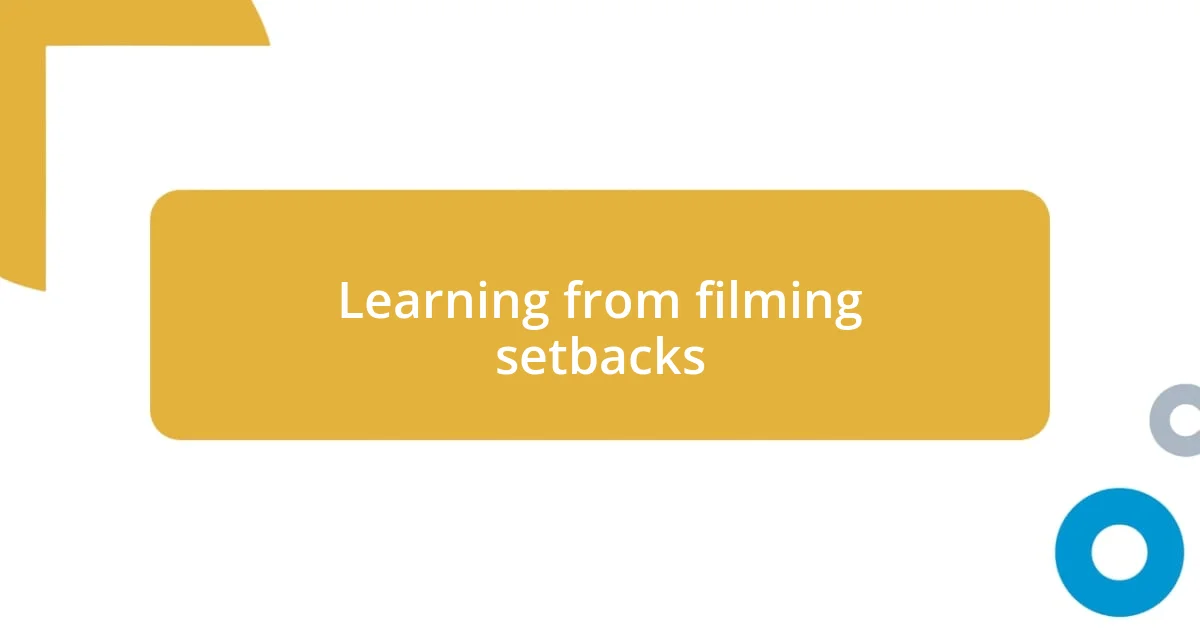
Learning from filming setbacks
One challenge that stands out in my mind happened during a long shoot where we lost critical footage due to a technical malfunction. I felt a wave of frustration wash over me – how could this happen? As painful as it was, I took a step back to reflect. I realized that we hadn’t backed up our files as regularly as we should have. That setback taught me the invaluable lesson of redundancy. Now, I never skip a chance to remind my team about the importance of consistent backups. Have you ever faced a hurdle that later made you appreciate the need for preventive measures?
Another scenario that etched itself into my memory was when a key actor had to drop out just days before filming. I remember feeling that tightening knot in my stomach. Instead of allowing fear of disruption to eat away at our morale, we convened as a team. Through brainstorming and collaboration, we not only selected a compelling replacement but also forged an even stronger camaraderie. This experience reminded me that challenges can often foster resilience. How do you transform obstacles into stepping stones on your own projects?
Perhaps the most pivotal lesson came from a simple mistake during editing. I had overlooked some audio issues, and the final cut turned out distorted. Initially, it felt like a crushing blow, but once I dove into the solutions, I realized how much I had learned about audio engineering. Each setback reshaped my approach, leading me to invest time in understanding every facet of the filmmaking process. It was a painful but necessary growth spurt. Have you ever turned a setback into an opportunity for growth?
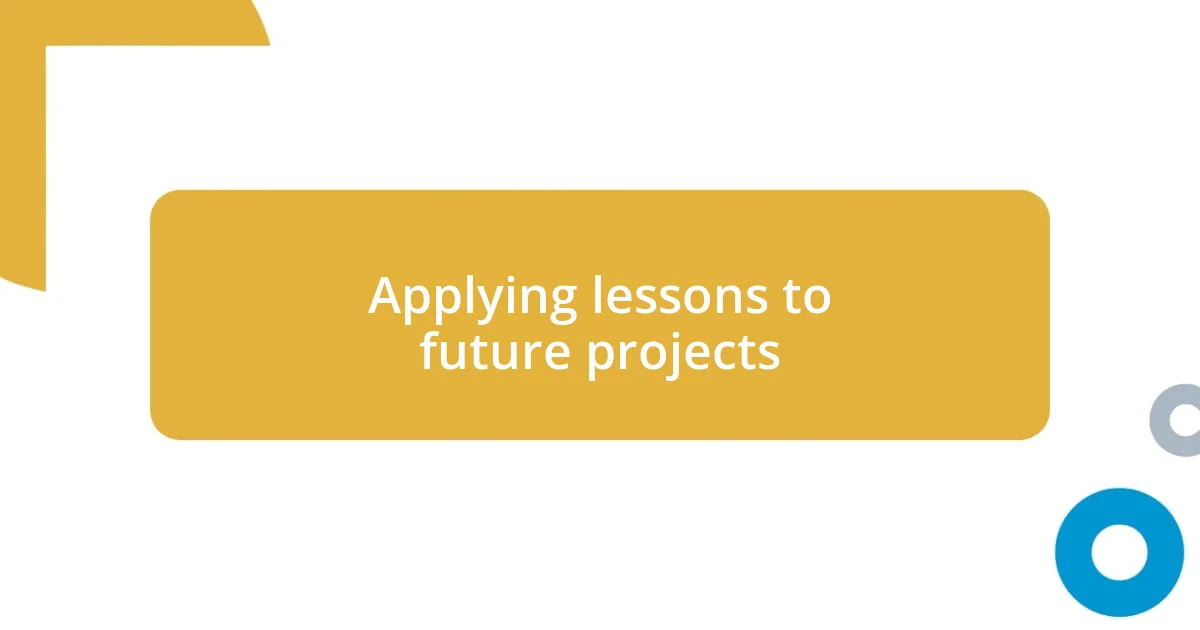
Applying lessons to future projects
When it comes to applying the lessons I’ve learned, I often reflect on the power of adaptability. I remember a time when our shooting schedule drastically changed due to unexpected weather. Instead of panicking, we shifted locations and leveraged the natural beauty of the rain-soaked scenery. That day taught me that rather than resisting change, embracing it can lead to even more captivating results. Have you ever discovered something extraordinary in the midst of a curveball?
Another profound lesson emerged after screening a film that didn’t resonate with audiences as we had hoped. Rather than dwelling on disappointment, I sought feedback from both my team and viewers. This experience instilled in me the importance of audience insight and collaboration during pre-production. Now, I actively include testing sessions with target audiences to tweak narratives before finalizing anything. Isn’t it fascinating how the opinions of others can illuminate aspects we might overlook?
As I embark on new projects, I also prioritize creating an environment where everyone feels empowered to voice their ideas. One time, a passionate intern introduced a pitch that initially seemed impractical, but I decided to explore it further. Together, we brainstormed and eventually crafted a scene that enriched the narrative significantly. This taught me that innovation often lies outside of conventional thinking. How often do you encourage others to step outside their comfort zones to ignite creativity?












